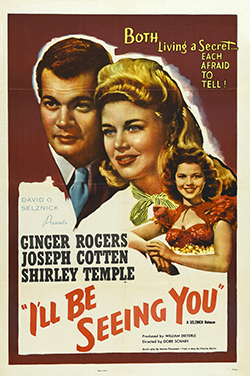Plot
Social outcasts Mary Marshall and Sgt. Zachary Morgan meet while seated across from each other on a train bound for Pinehill. Zach, a victim of PTSD, then termed shell shock, has just been granted a ten-day leave from a military hospital to try to readjust to daily life. Mary, convicted for involuntary manslaughter, has just been given an eight-day furlough from prison to spend the Christmas holiday with her aunt Sarah and uncle Henry in Pinehill. Each harbours a secret. Mary lies to Zach that she is a travelling saleslady on her way to spend the holidays with her family, while Zach tells Mary that he is going to visit his sister in Pinehill. After the train pulls into the station, the two exchange names. Mary then goes to the Marshall home, where she is reunited with Henry, Sarah and cousin Barbara.
Zach, meanwhile, checks into the YMCA. Unsure of herself after a three-year confinement in prison, Mary laments the loss of her youthful dreams of having a husband and family. Soon after, Zach phones and Mary invites him to dinner. After the meal, Zach confesses to Mary that he has no sister and stopped in Pinehill just to be near her. He and Mary then attend a war movie, but Zach falls mute when Mary questions him about his own experiences in the war. While stopping at a café afterward, Zach panics when the soda jerk, Swanson, who is afflicted with a facial tic, recounts being shell-shocked during World War I. Apprehensive that his affliction will also result in disfigurement, Zach flees the café and is unable to share his fears with Mary.
Upon returning home, Mary, who is sharing Barbara's room, finds that Barbara has labeled her possessions. Realizing that Barbara distrusts her, Mary relates the circumstances that sent her to prison. After the death of her parents, Mary had gone to work as a secretary. One night, her wealthy boss invited her to dinner at his apartment and Mary naively accepted, believing that he was inviting her to a party. Shocked to discover that she was the only guest, Mary was then accosted by her drunken boss. While struggling to avoid his advances, Mary pushed him away, sending him to his death through an open window, and Mary was sentenced to six years in prison. At the end of Mary's story, Barbara, who is touched by her cousin's misfortune, begs her forgiveness.
The next day, Zach invites Mary to the lake and there explains his behavior of the previous night. After voicing his fears of becoming like Swanson, Zach asks Mary to help him believe in himself as she believes in herself. Over Christmas dinner at the Marshall house, Zach rhapsodizes about feeling at home with the family. Aware that her stay with the family is temporary, Mary becomes despondent and asks Sarah if she should tell Zach the truth. Sarah counsels her to remain silent. When Zach invites the Marshall family to the New Year's Eve party at the YMCA, Sarah buys Mary a new dress for the occasion. At the party, a US Senator solicits Zach's opinion as a soldier on political issues, and Zach outspokenly replies that each soldier is an individual and, as such, holds different opinions. While walking home with Mary after the dance, Zach is attacked by a dog and fends off the animal until its owner arrives to restrain it. As Mary bids Zach goodnight, she comments that he has regained his confidence and is now recovered. Knowing that they are both scheduled to leave the next day, Zach tries to discuss their future together; but Mary feigns sleepiness and asks to delay the discussion. Entering the house in tears, Mary confides her love for Zach to Sarah.
Meanwhile, after jubilantly returning to his hotel room, Zach suffers a relapse but is restored by recalling the sound of Mary's voice. The next day, Zach comes to the Marshall house to say goodbye. While alone with Zach, Barbara, not knowing that Zach is unaware of her cousin's conviction, mentions some of the details of Mary's prison sentence. Mary senses that something is wrong when Zach suddenly becomes distant and silently boards the train. Upon returning home, Mary discovers that Barbara has divulged her secret and collapses, weeping. But that night, as Mary approaches the gates of the state prison, Zach steps from the shadows to embrace her and declare his love.
